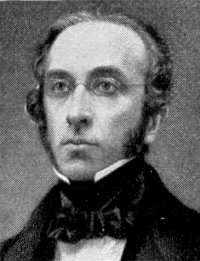Great Throughts Treasury
This site is dedicated to the memory of Dr. Alan William Smolowe who gave birth to the creation of this database.

Robert C. Winthrop,fully Robert Charles Winthrop
American Statesman
"Slavery is but half abolished, emancipation is but half completed, while millions of freemen with votes in their hands are left without education. Justice to them, the welfare of the States in which they live, the safety of the whole Republic, the dignity of the elective franchise, - all alike demand that the still remaining bonds of ignorance shall be unloosed and broken, and the minds as well as the bodies of the emancipated go free."
"The noblest contribution which any man can make for the benefit of posterity, is that of character. The richest bequest which any man can leave to the youth of his native land, is that of a shining, spotless example."
"There are no points of the compass on the chart of true patriotism."
"The poor must be wisely visited and liberally cared for, so that mendacity shall not be tempted into mendacity, nor want exasperated into crime."
"The noblest contribution which any man can make for the benefit of posterity, is that of a good character. The richest bequest which any man can leave to the youth of his native land, is that of a shining, spotless example."
"A star for every State, and a State for every star."
"From the year 1789 to the year 1860 no nation has ever known a more unbounded prosperity, a fuller space of happiness. In the short space of seventy years, within the turn of a single life, the nation, poor, weak and despised, raised itself to the pinnacle of power and of glory."
"I confess, Sir, I am at a loss to conceive how any man, who has ever read our Constitution as originally framed, or as it now exists, can listen a moment to such an argument. If anything be clearer than another on its face, it is, that it was intended to constitute a Christian State. I deny totally the gentleman's position, that the religious expressions it contains were intended only to show forth the pious sentiments of those who framed it. They were intended to incorporate into our system the principles of Christianity, ? principles which belonged not only to those who framed, but to the whole people who adopted it. Sir, the people of that day were a Christian people; they adopted a Christian Constitution; they no more contemplated the existence of infidelity than the Athenian laws provided against the perpetration of parricide. They established a Christian Commonwealth; they wrote upon its walls, Salvation, and upon its gates, Praise; and Christianity is as clearly now its corner-stone, as if the initial letter of every page of our Statute Book, like that of some monkish manuscript, were illuminated with the figure of the Cross!"
"In what region of the earth ever so remote from us, in what corner of creation ever so far out of the range of our communication, does not some burden lightened, some bond loosened, some yoke lifted, some labor better remunerated, some new hope for despairing hearts, some new light or new liberty for the benighted or the oppressed, bear witness this day, and trace itself, directly or indirectly, back to the impulse given to the world by the successful establishment and operation of free institutions on this American continent?"
"All societies of men must be governed in some way or other. The less they may have of stringent State Government, the more they must have of individual self-government. The less they rely on public law or physical force, the more they must rely on private moral restraint. Men, in a word, must necessarily be controlled, either by a power within them, or by a power without them; either by the Word of God, or by the strong arm of man; either by the Bible, or by the bayonet. It may do for other countries and other governments to talk about the State supporting religion. Here, under our own free institutions, it is Religion which must support the State."
"From the discovery of the New World, the mercantile spirit has been rapidly gaining upon its old antagonist; and the establishment upon these shores of our Republic, whose union was the immediate result of commercial necessities, whose independence found its original impulse in commercial oppression, and of whose Constitution the regulation of commerce was the first leading idea, may be regarded as the epoch at which the martial spirit finally lost its supremacy, which, it is believed and trusted, it can never again acquire."
"Our Country,?whether bounded by the St. John's and the Sabine, or however otherwise bounded or described, and be the measurements more or less,?still our Country, to be cherished in all our hearts, to be defended by all our hands."
"Without Virginia, as we must all acknowledge?without her Patrick Henry among the people, her Lees and Jefferson in the forum, and her Washington in the field?I will not say that the cause of American liberty and American independence must have been ultimately defeated?no, no, there was no ultimate defeat for that cause in the decrees of the Most High; but it must have been delayed, postponed, perplexed, and to many eyes and hearts rendered seemingly hopeless."
"I could not omit to urge on every man to remember that self-government politically can only be successful if it be accompanied by self-government personally; that there must be government somewhere; and that, if the people are indeed to be sovereigns, they must exercise their sovereignty over themselves individually, as well as over themselves in the aggregate?regulating their own lives, resisting their own temptations, subduing their own passions, and voluntarily imposing upon themselves some measure of that restraint and discipline which, under other systems, is supplied from the armories of arbitrary power?the discipline of virtue in the place of the discipline of slavery."